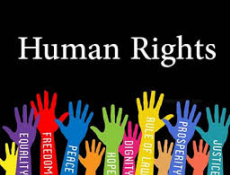
Email: ZYVC057@live.rhul.ac.uk
Total Article : 213
About Me:I'm a graduate student studying International Criminal Law and first started writing for King's News almost 4 years ago! My hobbies include reading, travelling and charity work. I cover many categories but my favourite articles to write are about mysteries of the ancient world, interesting places to visit, the Italian language and animals!

Tiananmen Square, China, 1989. Unarmed civilians were assaulted in a horrendous massacre during a student-led protest against Chinese political corruption. The very thing they had spent so much effort fighting for, the freedom to speak their minds, was taken away from them in a matter of hours. Although still to this day human rights activists in China fight for essential humanitarian freedoms, the massacre of 1989 proved to be a world-wide cry for increased protection of human rights; and the world finally listened.
Human rights are a rather late development in world politics and became a central part of the political agenda only after the terrifying atrocities which occurred during World War Two. The League of Nations, which was the international forum for countries before the United Nations, never really mentioned human rights explicitly, so they were possibly discussed but never rose to be an issue of world politics. What exactly are human rights? Human rights are universal entitlements and featured prominently in the American and French Revolution. Human rights were mentioned in the 1941 Atlantic-Charter between US President Roosevelt and UK Prime Minister Churchill as the freedom of speech, the freedom of religious belief, the freedom from fear and the freedom from need.
Human rights also play a formidable role in the UN as the Human Rights Commission was formed in 1946 (although since 2006 it has been called the Human Rights Council) and other UN organs such as the International Court of Justice seek to provide legal protection against the violation of rights. Many human rights institutions exist, the main regional ones being the African Charter on Human and People’s Rights, the American Convention on Human Rights and the European Convention on Human Rights, and other NGOs such as Amnesty International and Human Rights Watch report what they feel to be an issue of humanitarian concern.
Rights can range from political or economic to social, cultural or civil, and these are just a few! As human rights concerns are constantly on the rise one of the main questions the field is faced with is whose values precisely are being recognised as issues of human rights and whose aren’t. The news we read from papers can be very selective and whilst you can find pages on one violation of human rights, for example the Syrian conflict, a similar story in a different country may never be written on such a paper. Does this mean some human rights are more important depending on the location? Or is it just that some of the world’s most powerful countries would rather some major violations of human rights are ignored, like in the case of the wide scale tortures which occurred during the Bush administration post 9/11 as a means to find the culprits? Also, how far we should go to protect human rights and when is intervention permissible? If you worked for the United Nations how would you have responded to the Tiananmen Square massacre? Would you have intervened or merely ignored it not to create tension? Comment below!
IMAGE: http://www.outlookafghanistan.net/assets/2013/human_rights.jpg

0 Comment:
Be the first one to comment on this article.